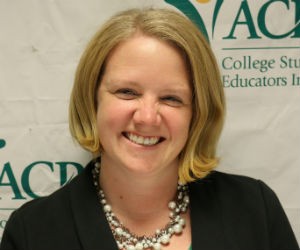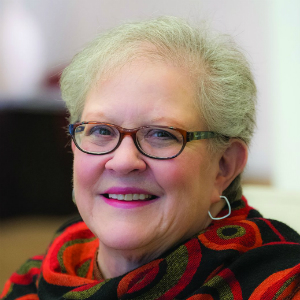To accompany the Friday, July 1, 2016 blog (“Go, Stay or Boycott?”), this edition of Friday With Joan sought out those who have dealt with the issue of holding meetings in states that have passed so-called “religious freedom” laws and the impact of those laws on holding meetings. To provide a legal perspective, I asked attorneys Barbara Dunn O’Neal and Steve Rudner to weigh in on the legal ramifications of the decisions groups make to contract or move a meeting.
I also reached out to Tricia Fechter Gates, lead global strategist for implementation at ACPA—College Student Educators International, and Richard Yep, CEO of the American Counseling Association (ACA), both of who are association veterans that have dealt with this issue in the past.
In the blog and accompanying these interviews are links to reading about the impact of these laws and of other issues that impact where and how we hold meetings. My hope is that we will engage in conversation (in the blog comments) about how your organization deals with issues and decisions when considering destinations and sites. This is specifically about a particular type of law; currently others are determining whether to go to the UK based on the recent Brexit vote.
All of this is another reminder that what we do may not be brain surgery or rocket science; it is, however, far more complex than most believe. We are faced with decisions requiring meeting professionals—a category that includes our partners in DMOs, hotels and with other vendor companies—to be aware of the news and to provide questions and guidance.
The opinions expressed by those interviewed are their own and in some cases reflect what their organizations’ decisions involved. The responses have been edited for clarity and space. Not every question was responded to by each of the respondents. To each of them, I am grateful for their participation and professionalism.
Q1: Please provide background information you’d like others to know about you.
Barbara Dunn O’Neal (BDO) is an attorney and partner with Barnes & Thornburg LLP in its Chicago office. For more than two decades, Barbara has focused her practice in meetings, travel and hospitality law on the group side. She also represents all types of nonprofit organizations on a variety of legal issues. Barbara is a frequent speaker and author for hospitality industry organizations and currently serves as president-elect of the Academy of Hospitality Industry Attorneys (AHIA). She has presented numerous webinars for Meetings Today (You can access past webinars, at no charge, here). You can connect with Barbara at barbara.dunnoneal@btlaw.com or 312.214.4837.
Tricia Fechter Gates (TFG) joined ACPA-College Student Educators International staff in April 2013 as the senior director, professional development, research and scholarship, and currently serves as the deputy executive director. Tricia leads the professional development and publications/research and scholarship teams and oversees the strategy, creation and execution of programs and publications.
Prior to working at ACPA, Tricia served as the Director of Events & Programs at Synergos, an association management company. She has previous work experience with the Association of Fraternal Leadership & Values, Rockhurst University and the University of South Carolina Aiken.
Tricia earned a bachelor’s in secondary education from Saint Louis University, a master’s degree in higher education and student affairs from the University of South Carolina, and an MBA from Rockhurst University. She holds a Ph.D. in Education and Human Resource Studies from Colorado State University. You can follow Tricia on twitter at @tfec and reach her by email at pfechter@acpa.nche.edu.
Steven M. Rudner (SMR) is managing partner of Rudner Law Offices, based in Dallas. The law firm exclusively represents hotels and resorts throughout the world in regard to meetings and conventions-related issues. Meetings Today (when it was called Meetings Focus) called Steve one of the “leading lights of our industry” and a top industry innovator. He is a past president of the Academy of Hospitality Industry Attorneys (AHIA) and frequently speaks on legal issues at hospitality industry events.
Steve can be reached at rudner@hotellawyers.com [A personal note: Steve, at a firm at which he once worked, was the first attorney for whom I served as an expert witness].
Richard Yep, CAE, FASAE (RY) is the chief executive officer of the American Counseling Association, the largest membership organization of professional counselors, with more than 56,000 members in the world, where he oversees a staff of 63 and a $13 million budget. Rich has worked for ACA for more nearly 30 years, the past 17 as the association’s CEO. His previous roles at ACA involved public policy, marketing and corporate planning. He is also the president of the American Counseling Association Foundation.
Rich has presented on various issues impacting not-for-profit organizations relative to public policy, leadership development, ethics, membership retention and product development.
Rich’s professional affiliations include the American Society of Association Executives (ASAE), where he has served on the Marketing Council, as a chair of the Committee on Diversity and Inclusion, and on the ASAE Board of Directors. Currently, Rich is on the ASAE Key Professional Associations Committee and a member of the ASAE Foundation’s Development Committee. He was named an ASAE Fellow in 2012.
He can be reached at American Counseling Association (www.counseling.org) by e-mail ryep@counseling.org, and on Twitter at @Richyep.
Q2: A number of associations and corporations struggled with what to do when so-labeled “religious freedom laws” were passed in states such as Indiana, North Carolina, Tennessee and Mississippi.
Q2a: For those with associations: What went into your association’s decision-making about how to handle the impact (on meetings? on the association? on your members and vendors?) of staying or leaving when already contracted meetings were in place?
A2a: TFG: We considered many factors, including the core values of our association, the costs of the move, the number of members who had already booked travel to the North Carolina location, and if we had enough time to properly market the move from Charlotte to Baltimore. We decided we did, in this case. We are currently considering other locations where we are already booked for larger events (including in Tennessee), including our convention, and the mechanics of whether we should move those events. For us (and I imagine for most), it was much easier to move a 125-person meeting that it would be to move a 3,500-person convention.
Q2b: Tell us more about the time frame in which you had to make decisions and how you, in your role, were involved in guiding the decision.
A2b: TFG: Our decision to leave Charlotte happened fairly quickly—we moved through the process and had a new location and had communicated the change in seven days. Again, this was a bit easier for a 125-person meeting. We also had fabulous hotel partners [including a hotel owner] on both ends who helped me to navigate both pieces of the contract quickly and efficiently.
A2a&b: RY: The Tennessee law that was enacted in April specifically took on the Code of Ethics of the American Counseling Association. As the code is one of the major components of what defines the profession, there was never any question that our organization needed to respond. Our code does not permit a counselor to deny services to someone based on the provider’s beliefs or values. Unlike some professional codes of ethics that are designed to protect the professional, ours looks at how to protect the client.
We simply could not stand by and watch a public policy making body make such changes. While we attempted to explain our views [prior to the signing of the law] to the [Tennessee] legislature (and then the governor), the bill was signed into law in early April 2016. Our board then had a series of electronic and phone conversations that led to our decision about three weeks later to relocate our [annual] conference from Nashville. It would be another four weeks until we selected San Francisco as the site of our 2017 conference.
Q3: For those with associations, in what way did your association’s policies, bylaws and/or D&I statements play a part in the decision-making? What financial considerations entered into the discussion and decision-making? In what ways did the DMOs (aka CVBs), hotel owners or management companies, play a role?
A3: TFG: Equity and inclusion is a core value of ours, so this drove our efforts to make sure we were holding our meeting in a space where all of our members/attendees felt safe, welcome and comfortable.
For this particular meeting, the hotel ownership group (GF Management) made it very easy for us to make the switch. We paid zero cancellation fees. [The association] ended up paying about $2,500 to assist attendees who had already booked travel to Charlotte and needed to make the move to Baltimore.
GF Management was fantastic to work with; it took one call with our executive director and their CFO, and we were moving forward, no questions asked. They understood our needs and made it happen quickly.
A3: RY: The overriding factor in our decision was the attack on our Code of Ethics. The other things such as our Bylaws and policies simply were the vehicles that empowered/authorized the board to make the decision. Our chair specifically asked that the first part of the conversation have NOTHING to do with the financial considerations, as we needed to look at this from a professional content point-of-view. The finances were secondary.
The Nashville CVC [aka CVB or DMO] was exceptionally gracious and even tried to advocate on our behalf with the governor’s office. If the law is repealed, we will certainly reconsider Nashville.
Q4: To the lawyers: I know “it depends” on so many circumstances and still, because I’ve dealt my entire career with groups on crafting contracts that are specific to their needs while being fair to the vendor partners—after 9/11 many groups tried to add “terrorism” as a condition under force majeure [read more here on a definition from the CIC APEX Contracts report, Before we address religious freedom and other laws and ordinances, your comments first on what constitutes force majeure for meetings and events.
A4: BDO: Force majeure describes a circumstance beyond either party’s control. Courts have held that the contracting parties are free to define what constitutes a force majeure for purposes of the contract. Without the inclusion of reference to laws, ordinances, human or civil rights, it is more difficult for groups to argue that the law, etc., falls within the definition unless the definition includes a catch-all phrase such as “or other cause beyond the parties’ control.”
Making the “grocery list” of bad occurrences is just the first of two key requirements in any force majeure provision. The second (and often more important) requirement is what impact the “bad thing that happened” had on performance. Did it make performance impossible, illegal or commercially impracticable? Often a group can argue that the law, etc., falls within the grocery list but if the only standard of impact under the clause is impossible, the group cannot meet the second requirement as the hotel is still open for business.
A4: SR: A properly written force majeure clause requires the occurrence of something objectively both horrible and unforeseeable, which makes performance of the contract impossible.
JE: For something like religious freedom laws or other laws or ordinances passed by municipalities or states that occur after a contract is signed, what remedies are there for groups?
BDO: From a legal standpoint, the only remedy falls within the contract. If the force majeure clause doesn’t allow the group to argue that the law, etc., is on the grocery list or if there isn’t a catch-all provision or if the standard of impact is impossibility, the group will remain legally bound to the contract. As such, if the group still wants to cancel the contract because of the law, etc., it must pay a cancellation fee. I have had associations do just that in the past when they didn’t have a clause that addressed labor issues and the hotel in question was involved in a labor dispute.
SR: There is no legal support for the use of a force majeure clause to cancel a meeting because of the passage of any legislation. Certainly parties are free to negotiate for a separate provision that would allow a cancellation if legislation is passed to which the group has objection, but that is not a force majeure. And any group that wants to be able to cancel if legislation they do not like is passed, despite the fact that the hotel does not control the passage of any legislation, should be prepared for a hotel to seek a clause that enables it to raise the room rate if, for example, an unforeseen new attraction opens near the hotel, or to cancel the contract if the group adopts a position that the hotel finds offensive. In all of those examples, something has happened that neither party controls. Groups should never agree to such clauses; nor should hotels.
The only viable solution for a group that deems the right to cancel a meeting if legislation with which they do not agree is passed is to wait until the week or so before the meeting is to occur to contract for the meeting, at which time they can be comfortable about the state of legislative efforts in that jurisdiction.
JE: How would force majeure, “impossibility” or cancellation clauses be supported, legally?
BDO: The group would need to meet the two requirements of the force majeure provision: 1.) the bad thing is on the grocery list; and 2.), the bad thing impacted performance in a certain way, e.g. impossible.
Impossibility means truly no way, no how, which for hotel contracts means that the hotel is no longer standing or operational. This is highly unusual, which is why the “bar” needs to be set lower than “impossibility.” I recommend groups use the term “commercially impracticable,” which is a legally defined term essentially meaning that business minds would agree that performance is not reasonable.
For example, a blizzard shuts down all airports near the hotel but the hotel is open for business. While this doesn’t make performance “impossible” (group can take a bus, train, car, etc., to the hotel), reasonable minds would agree that performance is not reasonable.
Note that if a contract does not contain a force majeure provision, the concept still exists at law but the standard of impact will be impossibility, which, as noted above, is not ideal. That’s why including a clause that you can negotiate/customize is critical.
JE: If something like this, meaning the passage of a law that is in direct opposition to one’s policies or bylaws or mission, occurs, what do you advise?
BDO: Look for business solutions. If this development is likely to “go away” in the near future, consider rescheduling the meeting and working with the hotel to do so. If there’s no end in sight, the group may work with the national sales office for the hotel management company to see if they can place the business in another commonly managed hotel. While the hotel owners are likely different, this can often be a way to minimize or to eliminate any cancellation fee.
I also recommend groups confer with their leadership before taking any action. If the contract is weak on this point, is the group prepared to pay cancellation fees to uphold its position on a particular issue or, if it has to pay a cancellation fee, it will proceed but will issue a statement in support of its position, why it is still going to that city, etc.?
Ideally, including a provision in the contract about these types of laws is the best way to proceed. In fact, this doesn’t need to be in a force majeure provision. Instead, it can be in a standalone provision that simply states that if the city or state passes any law, regulation or ordinance or is engaged in any activity, either of which is contrary to group’s position on such issue, the group can cancel the contract without liability.
SR: We are blessed to live in a wonderful country, in which we have the right to breach contracts when we feel compelled to do so. Any group that feels it must cancel a meeting, based on its principles, is free to take a brave stand and do so. But those groups must also recognize that taking a brave stand is not really quite so brave when you want someone else to pay for your brave stand. If you want to cancel a meeting because you are upset about legislative or other developments, you should feel free to do so, but you should understand that the price you pay for taking your stand is the payment of the cancellation damages set forth in the contract.
And you might also consider whether breaking the contract helps or harms the position which you advocate. Perhaps bringing hundreds of people to the city or state which has adopted bad legislation, and taking time out of your program to descend upon the state’s Capitol, holding a press conference condemning the legislation and saying that your group will not return if the laws are not changed, might be more effective than simply not holding the meeting.
Q5. To all of you: What now? In what ways will your association or your clients (for the lawyers) think about these issues?
A5: TFG: We have updated our contract clauses for force majeure. We are working with our 2017-2020 Convention sites (already contracted) to hopefully have the centers and hotels adopt the clause into our existing contracts. For 2021 forward, all contracts include the clause.
Our governing board is discussing future site locations at their in-person meeting in July. Do we still go, and advocate? Are there places we absolutely will not go? How do we outreach to members who might live in these areas if we decide there are places we will not go?
A5: BDO: Hope for the best but plan for the worst. Work to address all contingencies which could impact contract performance. Decide as an organization whether your position will be not to do business with cities, facilities, etc., which are contrary to its own or instead, show its stance in other ways.
Organizations must think about these issues in a worst-case scenario and plan accordingly, both from an economic standpoint and from a “political” or public relations standpoint. Will there be more discussion about what could impact where you hold meetings? There should be and always including a “catch-all” phrase that will cover event developments that we could never imagine would occur.
Will there be more strategic thinking? Again, there should be. Planning a response before it becomes a crisis is a best practice; develop press releases, position statements that are ready to go if (or perhaps when) one of these issues arises so that the organization has a well-thought-out plan and is not likely to rush and to say or to do something in the heat of the moment that may have a long lasting impact.
A5: SR: Hotels will continue to enforce group sales contracts, as they always have. The situation in North Carolina is not new. Groups canceled meetings in Arizona in 1990 after the governor rescinded the Martin Luther King Jr. holiday. Groups canceled meetings in Colorado in 1992 after the state adopted an amendment that would prohibit anti-discrimination laws for the LGBT community. Groups boycotted Miami starting in 1990 after a proclamation welcoming Nelson Mandela to the community was rescinded.
Though the political issues may be new, the law remains the same. When a group breaches a contract in support of a boycott or for any other reason, damages are due for that breach.
A5: RY: This situation made us more aware of what needs to be considered. We will seriously look at clauses in future contracts that could help extract us from locations that take actions in opposition to our positions.
IMPORTANT NOTE FROM JOAN: Because of scheduling, Lenay Gore, senior director, meetings and tradeshows, for the American Public Transit Association, was unable to answer the above questions. She did provide the following input on their decision to hold the meeting in Charlotte after HB2 was signed in North Carolina and after others canceled. Below that is the public statement APTA released. I strongly urge you to click the link and read through it!







